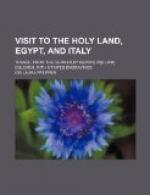May 26th,
a slight breath of wind arose, we hoisted two or three sails, and glided slowly and noiselessly towards the sea.
Mr. B. had bargained with the captain to keep as close to the shore as possible, in order that we might see the towns as we passed. Excepting in Caesarea, it was forbidden to cast anchor any where, for the plague was raging at Sur (Tyre) and in several other places.
Bargains of this kind must be taken down in writing at the consulates, and only one-half of the sum agreed should be paid in advance; the other half must be kept in hand, to operate as a check on the crew. After every precaution has been taken, one can seldom escape without some bickering and quarrelling. On these occasions it is always advisable at once to take high ground, and not to give way in the most trifling particular, for this is the only method of gaining peace and quietness.
Towards seven o’clock in the morning we sailed by the town and fortress of Saida. The town looks respectable enough, and contains some spacious houses. The fortress is separated from the town by a small bay, across which a wooden bridge has been built. The fortress seems in a very dilapidated condition; many breaches are still in the same state in which they were left after the taking of the town by the English in 1840, and part of the wall has fallen into the sea. In the background we could descry some ruins on a rock, apparently the remains of an ancient castle.
The next place we saw was Sarepta, where Elijah the prophet was fed by the poor widow during the famine.
The Lebanon range becomes lower and lower, while its namesake, the Anti-Lebanon, begins to rise. It is quite as lofty as the first-named range, which it closely resembles in form. Both are traversed by fields of snow, and between them stands a third colossus, Mount Hermon.
Next came the town of Tyre or Sur, now barren and deserted; for that mighty scourge of humanity, the plague, was raging there to a fearful extent. A few scattered fragments of fortifications and numerous fallen pillars lie strewed on the shore.
And now at length I was about to see places which many have longed to behold, but which few have reached. With a beating heart I gazed unceasingly towards St. Jean d’Acre, which I at length saw rising from the waves, with Mount Carmel in the background. Here, then, was the holy ground on which the Redeemer walked for us fallen creatures! Both St. Jean d’Acre and Mount Carmel can be distinguished a long distance off.
For a second time did a mild and calm night sink gently on the earth without bringing me repose. How unlucky it is that we find it so much harder to miss comforts we have been used to enjoy, than to acquire the habit of using comforts to which we have been unaccustomed! Were this not the case, how much easier would travelling be! As it is, it costs us many an effort ere we can look hardships boldly in the face. “But patience!” thought I to myself; “I shall have more to endure yet; and if I return safely, I shall be as thoroughly case-hardened as any native.”




